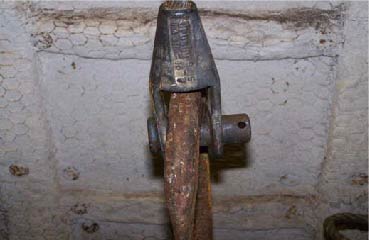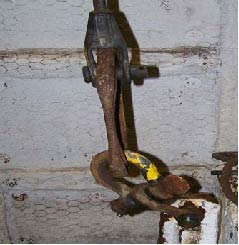Use of spelter sockets
A member has reported an incident onboard one of its vessel’s that has highlighted a potential safety issue for other IMCA member’s regarding the use of a particular type of open spelter sockets as wire rope terminations (plain load pin with split cotter pin type).
The incident occurred onboard a dive support vessel when the diving bell guide weight became detached from one of the wire rope guides at the termination end. As a result the vessel was unable to recover the guide weight without ROV subsea intervention.
The termination employed to connect the wire rope to the guide weight was an open jaw spelter socket fitted with plain load pin c/w split cotter pin which interfaced with the master link and a combination of shackles to a pad eye on the guide weight.
Following investigation, these points were noted:
- The disconnection occurred between the spelter socket and the master link and the spelter socket load pin was secured in position by the use of a split cotter pin only;
- It is not known how the spelter socket load pin became detached from the body of the socket. However, galvanic corrosion of the split cotter pin, incorrect fitting of the split cotter pin or side impact to the spelter socket load pin could have contributed to the failure. British Standard BS 463 states that the use of a ‘plain pin with split cotter pin’ is an ‘acceptable wire rope termination’, although this type of termination may not have been suitable for the purpose for which it was being employed;
- Open spelter sockets with ‘plain load pins’ are more suited to static connections. However, where it is necessary to make/break connections more frequently then closed spelter sockets should be used with an interfacing shackle, as these lifting accessories are commonplace and easy to change out or replace.


The following actions were recommended:
- Companies are encouraged to assess their use of spelter sockets and where possible use the closed type and suitable interface shackle;
- Where open spelter sockets must be used their suitability for the task should be assessed. If the spelter socket is to be used in a subsea lifting arrangement or experience any side impact (however minor) then the ‘screwed load pin with nut and split cotter pin’ securing type should be used.
Safety Event
Published: 4 February 2008
Download: IMCA SF 02/08
IMCA Safety Flashes
Submit a Report
IMCA Safety Flashes summarise key safety matters and incidents, allowing lessons to be more easily learnt for the benefit of all. The effectiveness of the IMCA Safety Flash system depends on Members sharing information and so avoiding repeat incidents. Please consider adding safetyreports@imca-int.com to your internal distribution list for safety alerts or manually submitting information on incidents you consider may be relevant. All information is anonymised or sanitised, as appropriate.
IMCA’s store terms and conditions (https://www.imca-int.com/legal-notices/terms/) apply to all downloads from IMCA’s website, including this document.
IMCA makes every effort to ensure the accuracy and reliability of the data contained in the documents it publishes, but IMCA shall not be liable for any guidance and/or recommendation and/or statement herein contained. The information contained in this document does not fulfil or replace any individual’s or Member's legal, regulatory or other duties or obligations in respect of their operations. Individuals and Members remain solely responsible for the safe, lawful and proper conduct of their operations.
